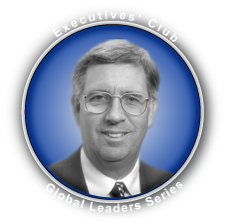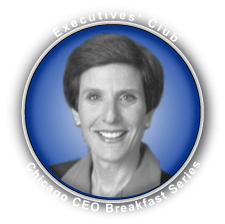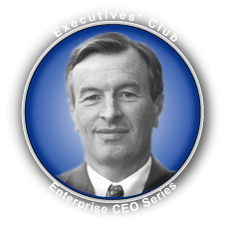Caterpillar CEO Pitches Free Trade to Business Leaders at Executives’ Club asks whether the U.S. is at turning point with global economy in the balance—A lack of courage?
 James W. Owens, Chairman and Chief Executive Officer of Caterpillar Inc., beseeched U.S. business and government leaders to find the courage to save free trade. The speaker at the Executives’ Club of Chicago’s Global Leaders Series, Owens addressed a packed house at the Hilton Chicago on 16 October 2007. His speech was immediately followed by the Club’s Technology Conference at which CIOs advised their peers on the emerging role of the CIO in the “networked economy 2.0.” James W. Owens, Chairman and Chief Executive Officer of Caterpillar Inc., beseeched U.S. business and government leaders to find the courage to save free trade. The speaker at the Executives’ Club of Chicago’s Global Leaders Series, Owens addressed a packed house at the Hilton Chicago on 16 October 2007. His speech was immediately followed by the Club’s Technology Conference at which CIOs advised their peers on the emerging role of the CIO in the “networked economy 2.0.”
A Ph.D. economist with extensive global management experience, Owens made a very convincing argument that the U.S. and the global economy are at a turning point. It is time for the U.S. to lead by example to assure the continuance of the free trade juggernaut that has produced so much wealth in the world. If it fails, the world stands before the prospect of sharply curtailed trade.
Following […]
Rebooting Kraft—CEO Outlines Growth Strategy clearly shows the innovation imperative: A Play in Two Acts, Starring the Consumer.
 Irene B. Rosenfeld, Chairman & Chief Executive Officer of Kraft Foods, outlined her vision for relaunching Kraft at the Executives’ Club of Chicago’s Chicago CEO Breakfast on May 30, 2007 at the Mid-America Club. She was enthusiastic about the company’s second lease on life: having spun off of Altria this spring, the company is newly independent, and she was eager to share her plan to drive growth by addressing the “eye of the consumer.” Irene B. Rosenfeld, Chairman & Chief Executive Officer of Kraft Foods, outlined her vision for relaunching Kraft at the Executives’ Club of Chicago’s Chicago CEO Breakfast on May 30, 2007 at the Mid-America Club. She was enthusiastic about the company’s second lease on life: having spun off of Altria this spring, the company is newly independent, and she was eager to share her plan to drive growth by addressing the “eye of the consumer.”
Kraft Foods is the second largest food company in the world and the largest in North America. It has seven brands that produce revenue of over $1 billion and fifty that bring in over $100 million each. Central to her strategy is leveraging Kraft’s formidable brand portfolio and other economies of scale. Rosenfeld “came home to Kraft” about a year ago, having had highly visible leadership roles at the company in the past and the top job at Frito-Lay immediately prior.
[…]
UPS: Transforming Package Delivery into a One-to-One Business summarizes the CEO’s vision for meeting customer empowerment with transformation.
 Michael L. Eskew, Chairman and CEO of UPS, outlined the package delivery giant’s vision for transforming itself into a “one-to-one” business at the Executives’ Club of Chicago’s Enterprise CEO Lunch, 15 February 2007. Before a packed house at the Chicago Hilton, he demonstrated UPS’s creative “whiteboard” marketing campaign and explained its role in communicating to customers the value of the company’s transformation. Michael L. Eskew, Chairman and CEO of UPS, outlined the package delivery giant’s vision for transforming itself into a “one-to-one” business at the Executives’ Club of Chicago’s Enterprise CEO Lunch, 15 February 2007. Before a packed house at the Chicago Hilton, he demonstrated UPS’s creative “whiteboard” marketing campaign and explained its role in communicating to customers the value of the company’s transformation.
The importance of UPS’s vision extends beyond UPS stakeholders because it reflects a shift in emphasis away from industrial efficiency to knowledge-based innovation. Make no mistake, efficiency is mission-critical to every business, but fewer companies can differentiate based on efficiency. To its considerable credit, UPS sees the shift and is striving to empower customers with information as well as delivery services.
A History of Transformation
Mr. Eskew set the context by emphasizing that UPS has a history of transforming itself to meet technology and market challenges:
Founder Jim Casey began the company as bicycle messenger service in 1907, but emerging technology, […]
Retrofitting GM, the Quintessential Industrial Economy Enterprise reflects Knowledge Economy disruption as production-focused enterprises languish as customers continue to forsake them.
 As readers of these pages know well, I estimate that one of the most poignant changes that faces Industrial Economy enterprises is shifting their primary focus from production and operations to the customer. The Industrial Economy mechanized work and production, and by any measure it created unprecedented wealth by drastically lowering per-unit costs of any kind of product you can name, bringing more products within the means of more people. This worked extremely well while demand exceeded supply: customers were excited to have their first car/house/television, and they were happy with what producers brought to market. As readers of these pages know well, I estimate that one of the most poignant changes that faces Industrial Economy enterprises is shifting their primary focus from production and operations to the customer. The Industrial Economy mechanized work and production, and by any measure it created unprecedented wealth by drastically lowering per-unit costs of any kind of product you can name, bringing more products within the means of more people. This worked extremely well while demand exceeded supply: customers were excited to have their first car/house/television, and they were happy with what producers brought to market.
However, Industrial Economy CSFs (critical success factors) look extremely stale in the Knowledge Economy (also see Transformation: From Self-contained Company to Networked Global Organization). The e-business revolution has vastly enhanced communications, decreased cycle times and moved the mass customization model closer to reality.
Big Dealer to Detroit: Fix How You Make Cars (The Wall Street Journal, 9 February 2007) spells out the problem extremely well:
“One of the […]
Surprising Manufacturing Case Study Featured at IDC Outsourcing Forum shows how outsourcing is creating more onshore manufacturing jobs.
 Readers of U.S. and European press are too familiar with the plight of manufacturers—and how outsourcing is increasing cost pressures and sending even more jobs overseas. What is less known is that leading edge manufacturers are beginning to use outsourcing to increase local employment by making local companies more competitive. Readers of U.S. and European press are too familiar with the plight of manufacturers—and how outsourcing is increasing cost pressures and sending even more jobs overseas. What is less known is that leading edge manufacturers are beginning to use outsourcing to increase local employment by making local companies more competitive.
Forum attendees will hear how Midwest U.S. manufacturer Barry-Wehmiller, which was featured in BusinessWeek’s The Future of Outsourcing, is creating a new business that turns around manufacturers by improving their business processes, which makes them more competitive and ends up increasing local employment in many cases. Forum presenter Vasant Bennett is President of Barry-Wehmiller International Resources (BMIS) and a chief architect of BWIS’s emerging service offerings. He spoke to the Global Human Capital Journal last week.
[…]
|
|
 James W. Owens, Chairman and Chief Executive Officer of Caterpillar Inc., beseeched U.S. business and government leaders to find the courage to save free trade. The speaker at the Executives’ Club of Chicago’s Global Leaders Series, Owens addressed a packed house at the Hilton Chicago on 16 October 2007. His speech was immediately followed by the Club’s Technology Conference at which CIOs advised their peers on the emerging role of the CIO in the “networked economy 2.0.”
James W. Owens, Chairman and Chief Executive Officer of Caterpillar Inc., beseeched U.S. business and government leaders to find the courage to save free trade. The speaker at the Executives’ Club of Chicago’s Global Leaders Series, Owens addressed a packed house at the Hilton Chicago on 16 October 2007. His speech was immediately followed by the Club’s Technology Conference at which CIOs advised their peers on the emerging role of the CIO in the “networked economy 2.0.”
 Irene B. Rosenfeld, Chairman & Chief Executive Officer of Kraft Foods, outlined her vision for relaunching Kraft at the Executives’ Club of Chicago’s Chicago CEO Breakfast on May 30, 2007 at the Mid-America Club. She was enthusiastic about the company’s second lease on life: having spun off of Altria this spring, the company is newly independent, and she was eager to share her plan to drive growth by addressing the “eye of the consumer.”
Irene B. Rosenfeld, Chairman & Chief Executive Officer of Kraft Foods, outlined her vision for relaunching Kraft at the Executives’ Club of Chicago’s Chicago CEO Breakfast on May 30, 2007 at the Mid-America Club. She was enthusiastic about the company’s second lease on life: having spun off of Altria this spring, the company is newly independent, and she was eager to share her plan to drive growth by addressing the “eye of the consumer.” Michael L. Eskew, Chairman and CEO of UPS, outlined the package delivery giant’s vision for transforming itself into a “one-to-one” business at the Executives’ Club of Chicago’s Enterprise CEO Lunch, 15 February 2007. Before a packed house at the Chicago Hilton, he demonstrated UPS’s creative “whiteboard” marketing campaign and explained its role in communicating to customers the value of the company’s transformation.
Michael L. Eskew, Chairman and CEO of UPS, outlined the package delivery giant’s vision for transforming itself into a “one-to-one” business at the Executives’ Club of Chicago’s Enterprise CEO Lunch, 15 February 2007. Before a packed house at the Chicago Hilton, he demonstrated UPS’s creative “whiteboard” marketing campaign and explained its role in communicating to customers the value of the company’s transformation. As readers of these pages know well, I estimate that one of the most poignant changes that faces Industrial Economy enterprises is shifting their primary focus from production and operations to the customer. The Industrial Economy mechanized work and production, and by any measure it created unprecedented wealth by drastically lowering per-unit costs of any kind of product you can name, bringing more products within the means of more people. This worked extremely well while demand exceeded supply: customers were excited to have their first car/house/television, and they were happy with what producers brought to market.
As readers of these pages know well, I estimate that one of the most poignant changes that faces Industrial Economy enterprises is shifting their primary focus from production and operations to the customer. The Industrial Economy mechanized work and production, and by any measure it created unprecedented wealth by drastically lowering per-unit costs of any kind of product you can name, bringing more products within the means of more people. This worked extremely well while demand exceeded supply: customers were excited to have their first car/house/television, and they were happy with what producers brought to market. Readers of U.S. and European press are too familiar with the plight of manufacturers—and how outsourcing is increasing cost pressures and sending even more jobs overseas. What is less known is that leading edge manufacturers are beginning to use outsourcing to increase local employment by making local companies more competitive.
Readers of U.S. and European press are too familiar with the plight of manufacturers—and how outsourcing is increasing cost pressures and sending even more jobs overseas. What is less known is that leading edge manufacturers are beginning to use outsourcing to increase local employment by making local companies more competitive.